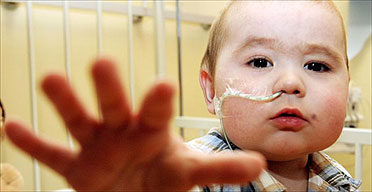
A 13-month-old baby left hospital today after undergoing pioneering life-saving treatment in which he was kept alive by an artificial heart for 120 days.
Jack Vellam became the youngest patient to be connected to such a device for such a length of time as he recovered from myocarditis, an inflammation of the heart muscle.
The boy, from Pitsford, Northamptonshire, was listed for a heart transplant after suffering a heart attack in March that left him so ill his mother initially agreed that his life support machine should be switched off.
After being transferred to the Freeman hospital, in Newcastle, Jack was placed on an extracorporeal membrane oxygenation (ECMO) machine, which acts as a temporary heart and lungs for those awaiting transplant.
But doctors decided to see if Jack could pull through without a transplant because around one in three children recover on their own. He was put on a device known as a Berlin heart - an external artificial heart, connected to his chest by four tubes, which pumps blood around the body.
The device stayed on for 120 days before it was removed in a complex operation 15 days ago. The longest period a Berlin heart has been used at the hospital is 150 days, but the patient in that case eventually had a heart transplant.
The consultant paediatric cardiologist Richard Kirk said: "He [Jack] would have died without the Berlin heart. You can realistically live on the ECMO life support machine he was using for four weeks - that would not have been enough time for a transplant or for him to recover from the myocarditis.
"What is unique about Jack is that he is the youngest patient ever to have this myocarditis and be kept alive on a Berlin heart for so long."
Jack's mother, Danielle Hastings, 18, said: "At first it was scary seeing the big tubes going in and out of my child's body but he soon got used to it. He used to sit on the tubes because they were nice and warm."
Ms Hastings said Jack remained cheerful throughout his treatment, which would now be continued at their local hospital in Northampton.
She added that she was looking forward to doing ordinary things with her son, such as taking him swimming or watching him learn to walk.
"It's still dawning on me that we are going home. I'm trying to take it all in. I want other parents to know that there is hope for their children if they are ill," she said.
Robin Martin, a heart consultant at Bristol hospital, said the Berlin heart was usually used to keep alive children waiting for a heart transplant.
"It serves as a bridge to transplant when the heart is weakened. It's usually used in cases of cardiomyopathy - where the heart muscle becomes inflamed and cannot pump blood round the body properly. It's a way of buying time until a new heart can be found for transplant."
The procedure is still rare in this country. Only seven patients at London's Great Ormond Street hospital for children and 10 at Freeman hospital have received Berlin hearts in the past two years.

